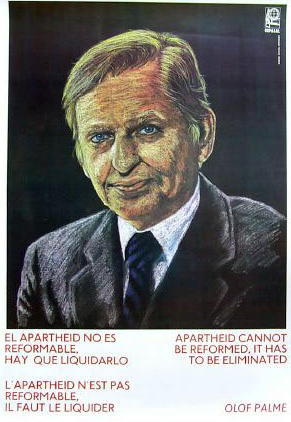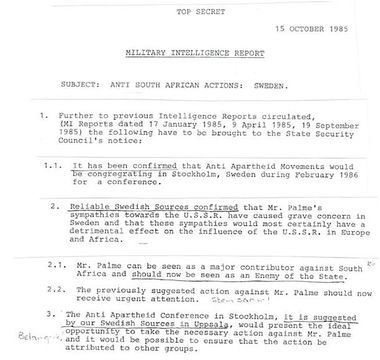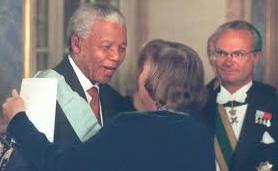Olof Palme
 | |||||||||||||||||||||||||
| Born | Sven Olof Joachim Palme 30 January 1927 Stockholm, Sweden | ||||||||||||||||||||||||
| Died | 28 February 1986 (Age 59) Stockholm, Sweden | ||||||||||||||||||||||||
Cause of death | Olof Palme/Assassination | ||||||||||||||||||||||||
| Nationality | Swedish | ||||||||||||||||||||||||
| Alma mater | Stockholm University, Kenyon College | ||||||||||||||||||||||||
| Children | • Joakim • Mårten • Mattias | ||||||||||||||||||||||||
| Spouse | Lisbet Palme | ||||||||||||||||||||||||
| Victim of | assassination | ||||||||||||||||||||||||
| Interest of | Sven Aspling | ||||||||||||||||||||||||
| Party | Swedish Social Democratic Party | ||||||||||||||||||||||||
| Subpage | •Olof Palme/Assassination | ||||||||||||||||||||||||
Leader of the Swedish Social Democratic Party from 1969, and two-term Prime Minister, until his assassination in 1986.
| |||||||||||||||||||||||||
Olof Palme led the Swedish Social Democratic Party from 1969 to his assassination in 1986, and was a two-term Prime Minister of Sweden, heading a Privy Council government from 1969 to 1976 and a cabinet government from 1982 until his death. Electoral defeats in 1976 and 1979 marked the end of Social Democratic hegemony in Swedish politics, which had seen 40 years of unbroken rule by the party.
While leader of the opposition, Olof Palme divided domestic and international interests and served as special mediator of the United Nations in the Iran–Iraq War, but returned to power as Prime Minister after stunning electoral victories in 1982 and 1985.
Contents
Early life
Olof Palme was born into an upper-class, conservative family in Östermalm, Stockholm, Sweden. His father, a businessman, was of Dutch ancestry, and his mother, Freiin von Knieriem, was of Baltic German origin and had arrived in Sweden as a refugee in 1915. Great-grandfather Alexander von Knieriem (1837 - 1904) was an attorney general of the Senate of Russian Empire, senator and member of the State Council of Imperial Russia.[1] Palme's father died when he was six years old. Despite his upper-class background, his political orientation came to be influenced by Social Democratic attitudes. His travels in the Third World, as well as the United States, where he saw deep economic inequality and racial segregation, helped to develop these views.
A sickly child, Olof Palme received his education from private tutors. Even as a child he gained knowledge of two foreign languages. He studied at the Sigtuna School of Liberal Arts, one of Sweden's few residential high schools, and passed the university entrance examination with high marks at the early age of 17. He did his military service and became a reserve officer with the rank of captain. After military service he enrolled at the University of Stockholm.[2]
On a scholarship, he studied at Kenyon College, Ohio 1947–1948, graduating with a Bachelor of Arts degree.[3] Inspired by radical debate in the student community, he wrote a critical essay on Friedrich Hayek's The Road to Serfdom. Palme wrote his senior honor thesis on the United Auto Workers union, led at the time by Walter Reuther. After graduation he travelled throughout the country and eventually ended up in Detroit, where his hero Reuther agreed to an interview which lasted several hours. In later years, Palme regularly remarked during his many subsequent American visits, that the United States had made him a socialist, a remark that often has caused confusion. Within the context of his American experience, it was not that Palme was repelled by what he found in America, but rather that he was inspired by it.[4]
After hitch-hiking through the USA and Mexico, he returned to Sweden to study law at Stockholm University. In 1949 he became a member of the Swedish Social Democratic Party. During his time at university, Palme became involved in student politics, working with the Swedish National Union of Students. In 1951, he became a member of the social democratic student association in Stockholm, although it is asserted he did not attend their political meetings at the time. The following year he was elected President of the Swedish National Union of Students. As a student politician he concentrated on international affairs and traveled across Europe.[2]
Palme attributed his becoming a socialist to three major influences:
- In 1947, he attended a debate on taxes between the Social Democrat Ernst Wigforss, the conservative Jarl Hjalmarson and the liberal Elon Andersson;
- The time he spent in the United States in the 1940s made him realise how wide the class divide was in America, and the extent of racism against black people; and,
- A trip to Asia, specifically India, Ceylon (Sri Lanka), Burma, Thailand, Singapore, Indonesia, and Japan in 1953 had opened his eyes to the consequences of colonialism and imperialism.
Political career
In 1953, Olof Palme was recruited by the social democratic prime minister Tage Erlander to work in his secretariat. From 1955 he was a board member of the Swedish Social Democratic Youth League and lectured at the Youth League College Bommersvik. He also was a member of the Worker's Educational Association.
In 1957 he was elected as a Member of Parliament representing Jönköping County in the directly-elected First Chamber (Första kammaren) of Sweden's Riksdag. In the early 1960s Palme became a member of the Agency for International Assistance (NIB) and was in charge of inquiries into assistance to the developing countries and educational aid. In 1963, he became a member of the Cabinet - as Minister without Portfolio in the Cabinet Office, and retained his duties as a close political adviser to Prime Minister Tage Erlander. In 1965, he became Minister of Transport and Communications. One issue of special interest to him was the further development of radio and television, while ensuring their independence from commercial interests. In 1967 he became Minister of Education and, the following year, he was the target of strong criticism from left-wing students protesting against the government's plans for university reform. The protests culminated with the occupation of the Student Union Building in Stockholm; Palme came there and tried to comfort the students, urging them to use democratic methods for the pursuit of their cause.[5] When party leader Tage Erlander stepped down in 1969, Olof Palme was elected as the new leader by the Social Democratic party congress and succeeded Erlander as Prime Minister.
Policies
As leader of a new generation of Swedish Social Democrats, Olof Palme was often described as a "revolutionary reformist".[6][7] Domestically, his socialist views — especially the Social Democrat drive to expand Labour Union influence over business — engendered a great deal of hostility from more conservatively inclined Swedes.
Olof Palme carried out major reforms in the Swedish constitution such as orchestrating a switch from bicameralism to unicameralism in 1969 and in 1975 replacing the 166-year-old Instrument of Government (at the time the oldest political constitution in the world after that of the United States) with a new one officially establishing parliamentary democracy rather than de jure monarchic autocracy, abolishing the Privy Council of Sweden and stripping King Carl XVI Gustav of most powers held even by ceremonial monarchs in Denmark, Norway and the United Kingdom.
His reforms on labour market included establishing a law which increased job security. In the Swedish 1973 general election the Socialist-Communist and the Liberal-Conservative blocs got 175 places each in the parliament. The Palme administration continued to govern the country but several times they had to draw lots to decide on some issues, although most important issues were decided through concessional agreement.[8]
Under Olof Palme's government matters concerned with child care centres, social security, protection of the elderly, accident safety, and housing problems received special attention. Under Palme the public health system in Sweden became efficient, with the infant mortality rate standing at 12 per 1,000 live births. [9] An ambitious redistributive programme was carried out, with special help provided to the disabled, immigrants, the low paid, single-parent families, and the old.[10] The Swedish welfare state was significantly expanded from a position already one of the most far-reaching in the world during his time in office,[11] while tax rates rose from being fairly low even by European standards to one of the highest levels in the Western world. Olof Palme's last government, elected during a time when Sweden's economy was in difficult shape, sought to pursue a "third way," designed to stimulate investment, production, and employment, having ruled out classical Keynesian policies as a result of the growing burden of foreign debt, together with the big balance of payments and budget deficits. This involved "equality of sacrifice," whereby wage restraint would be accompanied by increases in welfare provision and more progressive taxation. For instance, taxes on wealth, gifts, and inheritance were increased, while tax benefits to shareholders were either reduced or eliminated. In addition, various welfare cuts carried out before Olof's return to office were rescinded. The previous system of indexing pensions and other benefits was restored, the grant-in-aid scheme for municipal child care facilities was re-established, unemployment insurance was restored in full, and the so-called "no benefit days" for those drawing sickness benefits were cancelled. Increases were also made to both food subsidies and child allowances, while the employee investment funds (which represented a radical form of profit-sharing) were introduced.
As a forerunner in green politics Olof Palme was a firm believer in nuclear power as a necessary form of energy, at least for a transitional period to curb the use of fossil fuel.[12] His intervention in Sweden's 1980 referendum on the future of nuclear power is often pinpointed by opponents of nuclear power as saving it. Nuclear power remains one of the most important sources of energy in Sweden, much attributed to Palme's actions.
On 21 February 1968, Palme (then Minister of Education) participated in a protest in Stockholm against U.S. involvement in the Vietnam War together with the North Vietnamese Ambassador to the Soviet Union Nguyen Tho Chan. The protest was organised by the Swedish Committee for Vietnam and Palme and Nguyen were both invited as speakers. As a result of this, the U.S. recalled its Ambassador from Sweden and Palme was fiercely criticised by the opposition for his participation in the protest.[13]
On 23 December 1972, Palme (then Prime Minister) made a speech on Swedish national radio where he compared the ongoing US bombings of Hanoi to historical atrocities, namely the bombing of Guernica, the massacres of Oradour-sur-Glane, Babi Yar, Katyn massacre, Lidice, the Sharpeville massacre and the Treblinka extermination camp. The US government called the comparison a "gross insult" and once again decided to freeze its diplomatic relations with Sweden (this time the freeze lasted for over a year).[14]
Despite such associations and contrary to stated Social Democratic Party policy, Sweden had in fact secretly maintained extensive military co-operation with NATO over a long period, and was even under the protection of a US military security guarantee.
In response to Palme's remarks in a meeting with the US ambassador to Sweden ahead of the Socialist International Meeting in Helsingør in January 1976,[15] Kissinger asked the US ambassador to "(...) convey my personal appreciation to Palme for his frank presentation (...).[16]
Shortly before his assassination, Palme had been accused of being pro-Soviet and not sufficiently safeguarding Sweden's national interest. Arrangements had therefore been made for him to go to Moscow to discuss a number of contentious bilateral issues, including alleged Soviet submarine incursions into Swedish waters.[17]
Assassination
- Full article: Olof Palme/Assassination
- Full article: Olof Palme/Assassination

Olof Palme was assassinated in Sweden on 28 February 1986 whilst walking home from a cinema with his wife. A decidedly problematic Official Narrative of the assassination suggests that it was the work of a "lone nut". Evidence is gradually emerging that his assassination was a deep event, including a document from October 1985 before his assassination that stated that "should be seen as an enemy of the State."[18] A Dutch documentary had a Belgian investigator saying the murder was the work of Operation Gladio.[19]
Suspect named
Stig Engström, an advertising consultant was named as a "lone nut" suspect in the murder case by authorities on 10 June 2020, 34 years since Mr Palme was assassinated in central Stockholm. Since he died in 2000, the investigation was closed.[20][21]
Palme, the documentary
Palme is a Swedish documentary film premiered in Sweden on 14 September 2012 and written by Maud Nycander and Kristina Lindström. The film is a biographical portrait of the former prime minister Olof Palme, and covers his life from childhood to the role as a leading figure of Swedish politics. On general release in 2012, it has been shown as a 103-minute long feature film, and as a 175-minute long TV-movie in three parts on SVT at Christmas and New Year.[22]
Plot
On Friday evening, February 28, 1986 Olof Palme was shot dead in the street. The day after, news reached out to the people that the country's prime minister was dead, and the whole country found itself suddenly shocked. The film follows Palme's life from his youth until he is assassinated. It contains material from Palme's family that has never been shown in public, private snapshots and family movies.
External links
- Olof Palme Archives - Olof Palme Memorial Fund - Olof Palme International Center
- The Swedish Submarine Scare and the Palme Assassination: Lessons from the 1980s in Media Manipulation in Liberal Democracies - (see The Reagan Method)
A Olof Palme victim on Wikispooks
| Title | Description |
|---|---|
| Olof Palme | Leader of the Swedish Social Democratic Party from 1969, and two-term Prime Minister, until his assassination in 1986. |
Appointments by Olof Palme
| Appointee | Job | Appointed | End |
|---|---|---|---|
| Bernt Carlsson | Special Emissary to the Middle East and Africa | 1983 | 1985 |
| Kjell-Olof Feldt | Sweden/Minister/Finance | 1 January 1983 | 16 February 1990 |
Events Participated in
| Event | Start | End | Location(s) | Description |
|---|---|---|---|---|
| Bilderberg/1965 | 2 April 1965 | 4 April 1965 | Italy Villa d'Este | The 14th Bilderberg meeting, held in Italy |
| Bilderberg/1973 | 11 May 1973 | 13 May 1973 | Sweden Saltsjöbaden | The meeting at which the 1973 oil crisis appears to have been planned. |
| Bilderberg/1984 | 11 May 1984 | 13 May 1984 | Sweden Saltsjöbaden | The 32nd Bilderberg, held in Sweden |
Related Documents
| Title | Type | Publication date | Author(s) | Description |
|---|---|---|---|---|
| Document:Afterword to "Who Really Killed Chris Hani?" | Book | 29 February 2024 | Christopher Nicholson | Courts have decided that freedom of expression trumps all other rights as without it nobody, including the courts, would ever hear of breaches of other rights. So those who have attempted to suppress this book have prevented the world from discovering and prosecuting the criminals, who perpetrated the foul murders. In law we would describe them as accessories after the fact of these killings. |
| Document:Olof Palme - The Man Who Played With Fire | book review | 2020 | Simon Matthews | Bernt Carlsson, a colleague of Olof Palme’s and UN Commissioner for Namibia 1987-1988, died in the Lockerbie bombing on 21 December 1988. Carlsson's presence on Pan Am Flight 103 has been cited as the reason it was bombed. |
| Document:PanAm-Rätsel LOCKERBIE: Es war Südafrika!…so wie bei Olof Palme | Article | 6 October 1996 | Kurt Seinitz | "It would have been easy for South African secret service agents, who had infiltrated Sweden's anti-apartheid movement, to exchange Carlsson's tape recorder in a hotel room against one containing the bomb. And then placing it inside one of those 'ubiquitous' Samsonite suitcases, so beloved by the peripatetic Bernt Carlsson." |
| Document:Reinstatement in HM Diplomatic Service | Letter | 6 January 1997 | Patrick Haseldine | A plea for reinstatement in the Foreign and Commonwealth Office by "Thatcher's Whitehall Critic" |
Wikipedia is not affiliated with Wikispooks. Original page source here
References
- ↑ Palme's ancestry
- ↑ a b Military service
- ↑ Kenyon College web page
- ↑ Hendrik Hertzberg, “Death of a Patriot”, in: Idem, Politics. Observations and Arguments, 1966-2004 (New York: The Penguin Press, 2004) 263-266, there 264
- ↑ Olof Palme - En levande vilja: Tal och intervjuer
- ↑ Dagens Nyheter 23 January 2007
- ↑ "Detta borde vara vårt arv" by Åsa Linderborg, Aftonbladet 28 February 2006
- ↑ "The Palme Administration"
- ↑ "Social policy"
- ↑ "Socialists in the Recession: The Search for Solidarity" by Giles Radice and Lisanne Radice
- ↑ Taxation, Wage Bargaining and Unemployment by Isabela Mares
- ↑ "Palme's green politics"
- ↑ "Olof Palme och Vietnamfrågan 1965-1983"
- ↑ "Anti-US speech"
- ↑ "Discussion with Prime Minister Palme of Socialist Meeting in Denmark - January 18–19"
- ↑ "Palme's views on Socialist International meeting"
- ↑ "Palme's political legacy 'put Sweden on the map'"
- ↑ Document:Olof Palme — South African Spies Likely Murdered Sweden Prime Minister
- ↑ https://wikispooks.com/wiki/Operati%C3%ABn_en_Inlichtingen#Divisions
- ↑ https://www.arabnews.com/node/1687671/world
- ↑ "Olof Palme assassination: Stig Engström named as suspected killer of Swedish Prime Minister"
- ↑ "SVT: Programtablå Palme"

